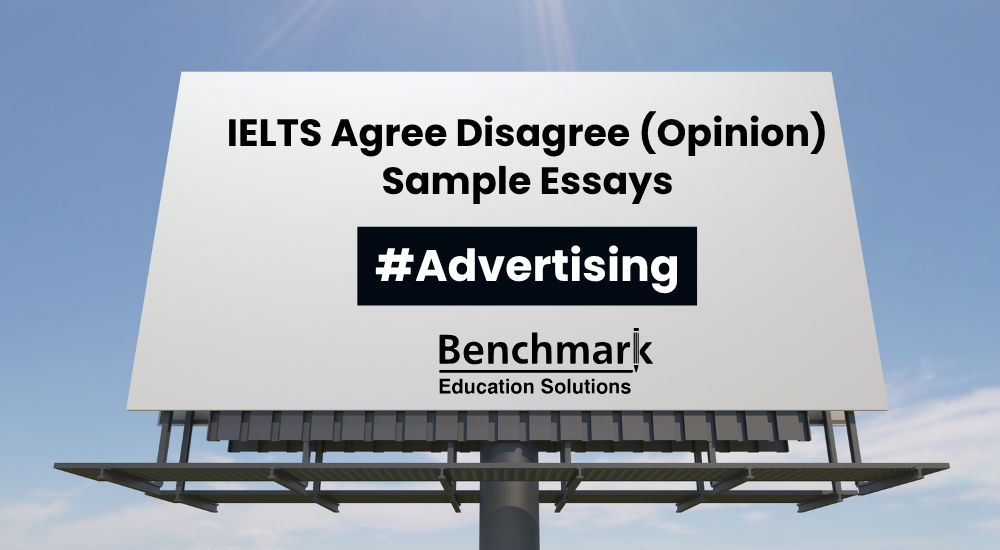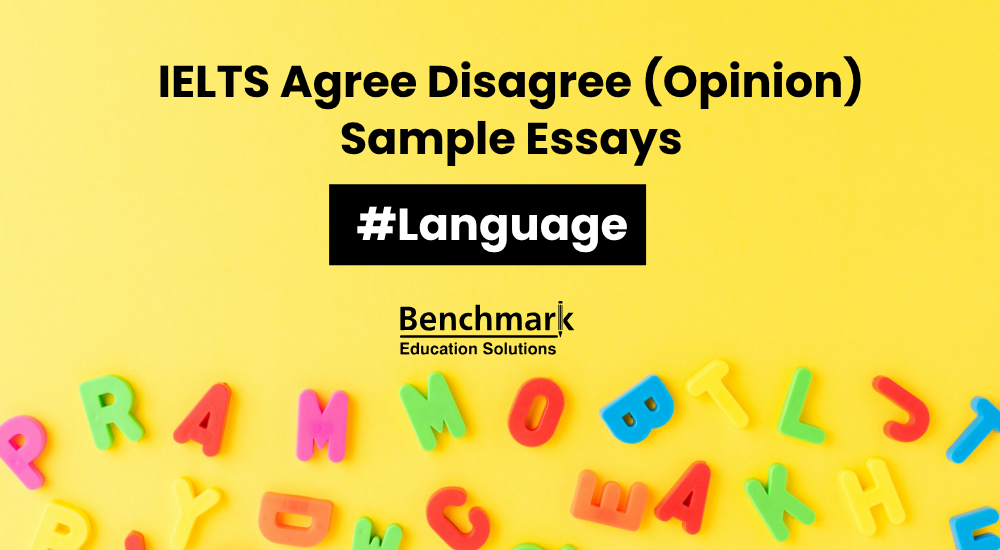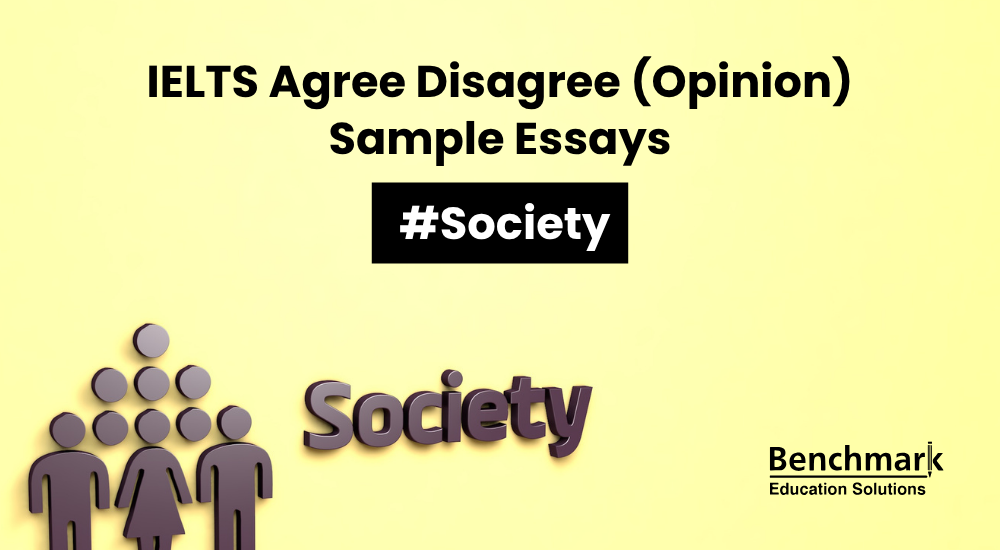Advertising in IELTS Writing Task 2: Agree or Disagree Essay Samples
- 0 Comments


Advertising is a frequent topic in the IELTS Writing Task 2, often exploring its effects on consumer behavior, society, and ethics. Common subtopics might include the influence of advertising on consumer choices, the impact of ads targeting children, the promotion of harmful products like junk food or alcohol, and the role of celebrities in advertisements.
Use Benchmark IELTS Writing Correction service to write error-free IELTS Essays, Letters & Reports.
Essay Topics
Task 1
Advertising discourages us from being different individuals by making us all want to be and look the same as each other. To what extent do you agree or disagree?
How approach the essay:
Break down the question by identifying the claim: advertising discourages individuality and promotes sameness. Decide your stance—do you fully agree, partially agree, or disagree?
| How Advertising Promotes Homogeneity | Examples / Evidence |
|---|---|
| • Encourages mass consumption of similar products to maximize corporate profits • Reduces individuality by promoting similar standards of appearance and lifestyle • Constant exposure to the same ads influences collective consumer behavior | • Fashion brands like H&M and Uniqlo promote standard apparel through advertising • Consumers often wear the same styles due to influence of marketing trends • Use of multiple channels (digital, print, TV) reinforces product visibility and uniform choices |
Model Answer
In recent years, the phenomenon of increasing homogeneity among individuals can be largely attributed to the pervasive influence of advertising. I agree with this idea, as advertisements not only promote a uniform set of products and services but also create a desire among consumers to adopt similar standards of appearance and lifestyle.
On one hand, advertising plays a pivotal role in promoting uniformity among individuals. Numerous industries and corporations are driven to maximize their profits, often resorting to persuasive marketing techniques, particularly through advertisements. These businesses, adept at understanding consumer psychology, frequently market identical products and services to cut operational costs. Advertising is the most effective tool for this, as it showcases a wide array of goods to potential buyers. For instance, fashion retailers such as H&M and Uniqlo consistently utilize commercials to market a comprehensive range of apparel. As a result, consumers who purchase from these brands often find themselves donning similar clothing and accessories, dictated by prevailing fashion trends and branding.
Moreover, the advertising industry continually bombards consumers with advertisements promoting the same products. This constant exposure adds to the proliferation of uniformity in consumer behavior. For example, contemporary advertising agencies frequently devise diverse strategies to enhance the sales of their clients’ products. These strategies may include digital advertisements on websites, print ads in prominent magazines and newspapers, or televised commercials. Consequently, people gravitate towards the same products and most consumers purchase and consume similar items, heavily influenced by the marketing they encounter.
In conclusion, I wholeheartedly support the notion that advertising stifles individuality, compelling us to conform to a collective identity rather than celebrating our unique differences.
Commentary
Essay Question: Advertising discourages us from being different individuals by making us all want to be and look the same as each other. To what extent do you agree or disagree?
Introduction
- Clarity: Clear introduction to the topic of advertising and sameness
- Thesis: Clear agreement with the view that advertising encourages uniformity
Body Paragraphs
Main Ideas (Pros/Cons):
- Advertising promotes similar products and lifestyles
- Constant exposure leads to uniform consumer behavior
Coherence: Well-structured; each paragraph develops one clear idea, with logical progression and relevant examples.
Conclusion
Summary: Effectively restates the writer’s stance and reinforces the main point about advertising stifling individuality
Vocabulary & Grammar
High-Level Vocabulary:
- Homogeneity – sameness
- Pervasive – widespread
- Conform – to follow or adapt to rules/styles
- Proliferation – rapid increase
- Stifles – suppresses or limits
Academic Phrases:
- “can be largely attributed to…”
- “plays a pivotal role…”
- “compelling us to conform…”
Complex Sentences:
- “Numerous industries and corporations are driven to maximize their profits, often resorting to persuasive marketing techniques…”
- “Consequently, people gravitate towards the same products and most consumers purchase and consume similar items…”
Overall: Strong response with a clear stance, logical structure, and good use of vocabulary and grammar.
Task 2
Today people are surrounded by advertising. This affects what people think is important and has a negative impact on people’s lives. To what extent do you agree or disagree?
How approach the essay:
Break down the question into two key ideas: the influence of advertising on people’s values and whether this influence is harmful.
| Negative Effects of Advertising | Examples / Evidence |
|---|---|
| • Creates distorted perceptions of products • Encourages unhealthy consumption habits • Manipulates consumer demand, impacting cost of living • Reduces consumer choice and leads to price inflation | • Celebrity-endorsed soft drink ads exaggerate benefits • Soft drinks linked to diabetes and other health risks • Aggressive advertising leads to monopolies in essential markets • Infant formula market dominated by few multinational companies |
Paragraph 3 should briefly acknowledge the opposing view—that ads inform consumers—but then reaffirm your stance. Paragraph 4 wraps up by reinforcing your main argument.
Model Answer
With the advent of sophisticated marketing and advertising techniques, including print media, billboards, and digital videos, the impact on individuals’ cognitive behavior has been profound. In my view, many of us are susceptible to selecting the wrong products due to the distorted perceptions that advertising creates regarding certain goods and services. This essay will explore these issues in detail.
To begin with, advertisements often exaggerate the benefits offered to consumers. For instance, popular soft drink commercials feature celebrities who promote unrealistic physical and psychological achievements, thereby encouraging unhealthy consumption habits. Moreover, research has shown that these beverages contain harmful substances, increasing health risks such as diabetes.
Additionally, advertising has negatively impacted the cost of living, by influencing ongoing economic fluctuations. As product marketing plays a crucial role in manipulating consumer demand, certain corporations have established monopolies in specific commodity markets. Consequently, consumers often find themselves with limited choices and may unknowingly fall victim to price manipulation. For example, in the infant formula industry, a handful of multinational companies dominate the market through aggressive advertising, limiting consumer choice and enabling price manipulation. Consequently, consumers often face inflated costs for essential products without access to affordable alternatives.
However, some economists argue that when consumers are better informed about the products they purchase, they are more likely to make smart purchasing decisions. This access to information empowers buyers in their decision-making processes, ultimately ensuring greater satisfaction with their purchases.
In conclusion, it is evident that aggressive marketing strategies have significantly shaped consumer behaviour since their inception. Therefore, it is imperative for authorities to implement necessary economic regulations to safeguard consumer rights.
Commentary
Essay Question: Today people are surrounded by advertising. This affects what people think is important and has a negative impact on people’s lives. To what extent do you agree or disagree?
Introduction
- Clarity: Clear topic introduction with relevant context (advertising techniques).
- Thesis: Clear stance—writer agrees advertising negatively impacts consumers.
Body Paragraphs
Main Ideas (Cons):
- Ads exaggerate benefits and promote unrealistic expectations.
- Influence on cost of living and market monopolies.
- Example of infant formula industry illustrating price manipulation.
- Counterpoint: Ads can help inform consumer choices.
Coherence:
- Logical progression from personal impact ? economic impact ? concession.
- Smooth transitions between ideas.
- Balanced but firmly supports the “agree” side.
Conclusion
- Summary: Restates main argument clearly, reinforces call for regulation.
- Opinion Reflection: Strongly supports view that advertising has negative effects.
Vocabulary & Grammar
High-Level Vocabulary:
- Sophisticated – advanced or complex.
- Distorted perceptions – misleading or inaccurate views.
- Manipulating consumer demand – influencing buying behaviour.
- Monopolies – market dominance by few companies.
- Price manipulation – artificial control of pricing.
Academic Phrases:
- With the advent of…
- It is evident that…
- In my view…
Complex Sentences:
- “With the advent of sophisticated marketing and advertising techniques… the impact on individuals’ cognitive behaviour has been profound.”
- “Consequently, consumers often face inflated costs for essential products without access to affordable alternatives.”
More Articles
IELTS Agree or Disagree Essay: Transportation Topics with Sample Answers
Transportation-related essay topics in the IELTS Academic Writing section often cover issues such as the environmental impact of different transport
Language in IELTS Writing Task 2: Agree or Disagree Essay Samples
In the Academic IELTS Writing section, language-related essay topics often focus on issues such as the role of English as
IELTS Agree or Disagree Essay: Society Topics with Sample Answers
IELTS Writing Task 2 often features society-related topics that require students to express opinions on modern social trends and challenges.
IELTS Agree or Disagree Essay: Employment Topics with Sample Answers
Employment-related topics often appear in the IELTS Writing Task 2 section, asking candidates to express opinions or discuss problems about












